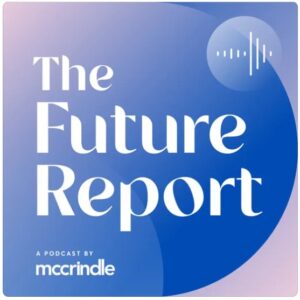With special guest Mark McCrindle, social analyst and demographer

Each generation’s economic and social experience is different, and goes a long way to shaping their property investment journey.
However, most agree their first property purchase was the hardest.
So is there still an appetite amongst the younger generation to enter the market.
To explore this I enlisted the expertise of Mark McCrindle, demographer, social researcher, bestselling author, and TEDx speaker.
He’s a thought leader in tracking emerging trends that influence society and is globally recognised for coining the term for the emerging generation, ‘Generation Alpha.’
Who are Gen Z?
Jarrod McCabe
First, for some who may not be familiar, could you give a quick overview of the age demographic of Gen Z in terms of when they were born?
Mark McCrindle
We’re talking about those born from 1995 to 2009. This means they range from their early 20s, with some still in their teen years, but certainly moving from the learning phase to the earning phase of life. As a result, they are starting to consider where and how they will live.
What are Gen Z’s property ambitions?
Jarrod McCabe
You and your colleagues have published a number of recent articles based on some fantastic research. One finding I found particularly interesting is that one of Gen Z’s top hopes is to own property, which will probably surprise some of our older listeners.
Mark McCrindle
Well, that’s right, they have not given up on the Aussie dream. They recognise that it has worked for their parents. They’ve seen clearly that property has been the key wealth accumulation vehicle for previous generations, and they don’t want to rely solely on superannuation for their future. Moreover, they’re living in a time of increased influence through social media and even reality TV shows about investment and property. All of this keeps that dream alive.
Gen Z’s challenges to property ownership
Jarrod McCabe
Most generations would say they’ve faced different challenges that prevented them or made it difficult to enter the property market. What does Gen Z view as their greatest challenge?
Mark McCrindle
They’re starting their economic lives a bit later than their parents did because they’re staying in education longer. Nationally, nine out of ten students now continue through to Year 12, whereas for their parents’ generation, half the class left at Year 10. That’s just the beginning. Then, the majority of those who complete Year 12 go on to tertiary education, with university being the most popular option.
Consequently, they are investing more time and more money in their education, which is beneficial for their careers and future. However, this also means that they don’t have the same level of savings and investments in their 20s as their parents did. So that’s a significant challenge. And even though they are moving into highly paid jobs and might do okay income-wise, wealth-wise they are a bit behind. The costs of entering the housing market have also increased significantly, leading many to live at home longer as well.
Gen Z vs Millennials vs Gen X vs Baby Boomers
Jarrod McCabe
From previous generations, with the current appetite and priority to enter the property market, is this unique to Gen Z? At the same stage in life, did Gen X, Millennials, and Baby Boomers have the same objective? Or was financial security or travel a higher priority for them at that age bracket?
Mark McCrindle
Millennials, now in their 40s, were not as focused on property at the same age. Back then, they didn’t feel the same pressure or urgency to get into the property market. They just assumed they would follow the pathway of their parents and eventually end up with a house like everyone else. Thus, their 20s were a time to travel and enjoy life. They spent money on depreciating assets – focusing on lifestyle rather than property.
What has happened, and the significant change we’re seeing, is that Gen Z has realised that securing a property is not guaranteed. In fact, it’s harder than ever. This realisation has made them more conscientious in this area. Now, the big shift we’ve seen is in what they look for in property.
Previously, the goal was to buy a property you could live in. Today, we’re seeing a generation say, ‘Well, I probably can’t afford to buy where I want to live, but I can be a rent-vestor – I can buy somewhere else and rent it out, while I continue to live where I prefer, even if that means staying with my parents longer, or renting a place.’ They’ve decoupled owning a home from living in that home, and that’s been a significant shift for this generation.
‘The bank of Nan and Pop’
“In Australia, baby boomers control or own around $6 trillion, a pretty phenomenal amount. When you consider their life stage, much of this wealth will be passed on over the next two to three decades. Many are choosing to support their grandchildren, who they see as needing the help more than their own children.”
Jarrod McCabe
For many previous generations, and certainly those of us in the property sector, we’ve often heard references to the ‘Bank of Mum and Dad.’ However, there appears to be a shift occurring. While many parents are still helping their children enter the market, some of the research you’ve conducted has shown that grandparents are starting to play a much bigger role in this as well.
Mark McCrindle
Well, that’s right. The parents of Generation Z are in their 40s and 50s, often saddled with their own debt, and not in a position to underwrite or co-purchase properties for their children. They are still very much in the working and spending phases of life. However, their grandparents, the baby boomers, are in a different position.
Today, these grandparents comprise about 20% of the population, yet they own 50% of Australia’s private wealth, much of which has been accumulated through property. This puts them in a better position to assist their grandchildren. In fact, our recent research indicates that many grandparents are keen to help out. They recognise the challenges their grandchildren face and see good opportunities to provide support. If not from the ‘Bank of Mum and Dad,’ then from the ‘Bank of Nan and Pop.’
Jarrod McCabe
When did you start to notice this trend, with grandparents getting more involved?
Mark McCrindle
It’s been in the last decade that we’ve seen this shift. Those in their 40s and 50s today, who might have been more financially liquid in the past, have carried their debt longer because it’s taking them more time to pay off their mortgages.
We’ve realised that it’s not the ‘Bank of Mum and Dad’ but rather the generation above – the baby boomers – who hold the wealth. In Australia, baby boomers control or own around $6 trillion, a pretty phenomenal amount. When you consider their life stage, much of this wealth will be passed on over the next two to three decades. Many are choosing to support their grandchildren, who they see as needing the help more than their own children.
So, yes, there’s a massive transition happening in Australia. In the past, retirees might have lived more of a pension-based lifestyle. Now, retirees are among the wealthiest Australians. While this isn’t universally true, many grandparents have more financial resources and are more willing to help out than ever before. They’re saying, ‘You know what, I want to help out my grandkids while I can, while I’m still active, rather than just leaving it all in their estate one day.
The impacts of COVID-19
Jarrod McCabe
Has COVID-19 influenced Gen Z’s mindset, in terms of making buying a home or property a priority. Especially given that people in Victoria had to spend a lot of time at home through lockdowns?
Mark McCrindle
Yeah, it sure has. Since the pandemic, we’ve seen volatility, which I think has instilled in young people the need for a bit of certainty in life. You need to plan for some consistency because economically, things are uncertain, and you never know what might happen on a global scale. This has made them a bit more financially conservative and more focused on planning rather than just going with the flow.
We’ve observed two other significant shifts since the pandemic. One, property prices have risen, which again has created a sense of urgency for this generation to get started in the market. We’ve seen both regional markets and the outer suburban areas open up, and people have realised that buying a home doesn’t mean you have to limit yourself to the place you grew up in – like the inner ring suburbs or the suburban areas of a capital city. You can look more broadly than that, which opens up a lot more opportunities for young people.
The other shift we’ve seen since the pandemic is the ongoing growth in our population. This has highlighted that with the demand increasing due to migration, you can’t just sit around and hope that prices will get better. You’ve got to be proactive and take action. All of this has created a sense of intentionality for this generation to get a foothold in property.
Changing property preferences
Jarrod McCabe
Regarding property type selection, and the topic of the pandemic, is the increased flexibility to work from home influencing this as well? Given that many employment opportunities now accommodate remote work, is this driving Gen Z’s willingness to consider locations a bit further out?
Mark McCrindle
Yes, due to their ability to work remotely or commute less frequently to the CBD, they are certainly prepared to move further out. What attracts them is not only the affordability that such locations offer but also the livability.
Suburbs a bit away from the city can provide a bit of bushland or a larger living space. The typical inner-city studio doesn’t hold the same appeal for a generation that needs their homes to double as workplaces. Perhaps their partner needs to work from home as well, and that second or spare bedroom becomes essential.
Thus, slightly larger places, even within the apartment market, are really of interest to this generation. It gives them more flexibility for planning, especially for some of them in their late 20s who are starting to think about starting families. Whether it’s a townhouse or a detached home, this extra space offers valuable planning opportunities for the future.
Jarrod McCabe
Gen Z seems to be quite flexible and open-minded about their options. They are prepared to consider apartments. They don’t necessarily need a house, nor does it have to be in the area where their parents lived.
It’s interesting to note that many of the areas that are now considered middle-ring suburbs in some capital cities were actually outer-ring suburbs when their parents purchased homes there. This shift isn’t necessarily understood by some previous generations. However, from what you’ve said, it seems that Gen Z understands this and is willing to adapt to these changes.
Mark McCrindle
Yes, I think being realistic with your expectations for your first place is crucial, as that’s what every generation before them has done. They started off with what they could afford and moved up over time. They didn’t outfit their homes with the best furniture right away. Instead, they borrowed items to make it work. They made sacrifices, recognising that maybe overseas travel isn’t a reality at the moment because of their mortgage, but they can move forward. And perhaps one day, they’ll be able to step up to that level. I think this smart attitude is resonating, and there’s a bit of influence from TikTok and other platforms that are showing how they got it done, providing a bit of inspiration for this generation as well.
Jarrod McCabe
It gives them opportunities. If they’re open to looking further out, it also means they’re prepared to explore ways to build equity, rather than just paying down a mortgage or relying on market appreciation. If you’re open-minded about purchasing something that isn’t brand new but a bit more dated, then over that 5 to 10 year period you’re in the property, you can start to make significant improvements. By upgrading kitchens, bathrooms, or if you’re fortunate enough to have a house, maybe creating off-street parking, these sorts of enhancements can really add value.
Mark McCrindle
Exactly right. And you know, this generation is starting to adopt a longer-term view. It’s challenging for young people today because we live in an era of instant gratification – they’re just a few clicks away from any piece of information or entertainment. Encouraging them to think about 10-15 year plans to pay down a mortgage or maintain a long-term investment perspective is contrary to their habitual culture and upbringing. But it is important, and they are managing to do it. They can do it because, earnings-wise, they’re in a secure place. There’s a skill shortage and an employment shortage, and this generation is stepping into roles and starting to see their incomes rise, which is fantastic. This gives them the confidence that in a secure employment environment, they can manage a bit of debt and take on that mortgage with confidence that they can pay it off. So, while the economic environment may make homes costly, there’s an upside in the form of more security around employment and earnings.
Take home message
Jarrod McCabe
It sounds like there’s a real appetite for property among Gen Z, which I think is a great thing. It also seems that they don’t exhibit the same rigidity that some previous generations might have had.
This openness creates really good opportunities for Gen Z to enter the market, especially if they consider all the different options and scenarios available to them.
Mark McCrindle
Exactly, and just a reality, a confidence among Gen Z that they can get it done. Despite constantly hearing about the high costs and all the negative news, it doesn’t mean it’s impossible. It certainly is possible.
I think when you invest in a place, when you own property in a nation, you start to feel good about that nation, city, or state. You become more invested in the community, which fosters a sense of contribution and hope for the future. So, it’s not just beneficial for their financial future. It’s also good for our community and nation. When this next generation owns property, they have a stake in the future of our country. And that’s beneficial for everyone.




